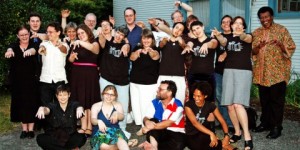I was lucky enough to attend a workshop taught by Jack Skillingsted and Nancy Kress over the weekend about “Writing in Scenes”. Nancy is renowned in SFF-land as being a gifted teacher, and Jack should be as well (as far as I know, he has done less of it). It was the excellent kind of workshop that balanced advice, concrete craft knowledge, great exercises, and lots of insightful asides that I doubt made it into their workshop notes but really enriched the day. The Clarion West One-day class (which, full disclosure, I am the administrator for), had a range of writers in different parts of their writing lives, and that got me thinking about how writing, in this deep way, never reaches a point where you stop learning. I think that is one of the intangible rewards of writing or doing any art: it is something you can sink into, give your all to, and never get bored of. It is also, of course, something that drives me bananas about writing. In any case, here were some things from the workshop that I found super useful:
1. The tension spine: Jack had this brilliant way of describing plot as this spine of tension that runs through the skeleton of your book, ever rising until the climax. As someone who can get really hung up the nine step method and the three acts and the heroes journey (etcetera to infinity) this was a more useful metaphor for me. Also, I am working (so hard!) on having more tightly plotted stories, so this was an excellent tool for evaluating my works in progress.
2. How important beginnings are: I know this, you know this, your mom knows this, but also it’s really good to remember that for a short story editor, you have maybe three paragraphs to catch their attention. For a book editor, maybe three pages. Polish and rework and polish and is it amazing yet? Make it even more amazing.
3. Sharpen your sentences: One of the delicious parts of reading is coming across fresh metaphors that crystallize some hidden meaning you’ve never been able to talk about. The job of the writer is to delight and engage the reader, and this can and should happen on the sentence level.
4. Sharpen your paragraphs and scenes: A scene works best when it has a good combination of dialogue, exposition, thoughts, and action. Get all that in there and make it awesome. Easy? No. Good idea? Yes.
And for any writers who are reading this and wondering if writing workshops, either short or long, are worth the cost, from my experience they can really shorten some of the time you spend bumbling through the woods on your writer’s journey, but at the same time if you don’t have the funds or time or convenience of geography, they are not fundamental to writing.

